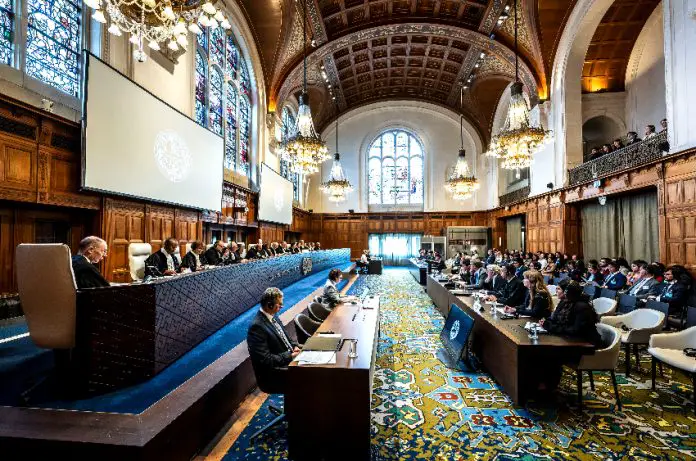Almost a month after Ecuadorian police broke into the Mexican Embassy in Quito and detained a former Ecuadorian vice president who was taking refuge there, Mexico and Ecuador are involved in a dispute over the matter at the International Court of Justice (ICJ) in The Hague, Netherlands.
During the second day of proceedings on Wednesday, Ecuador accused Mexico of blatant interference in its internal affairs by providing a safe haven for ex-vice president Jorge Glas, a convicted criminal and fugitive from justice until his arrest at the Mexican Embassy on April 5.
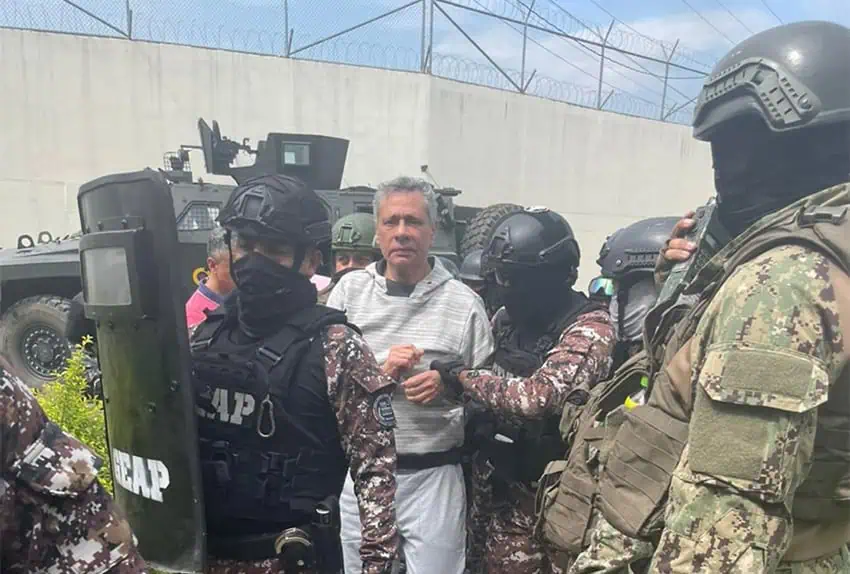
In that context, the South American nation defended its storming of the embassy, an act that Mexico, and many other countries, said was a violation of the Vienna Convention on Diplomatic Relations.
“Mexico, for months misused its diplomatic premises in Quito to shelter a common criminal,” Andrés Terán Parral, Ecuador’s Ambassador to the Netherlands and the head of its legal team in the ICJ case, told judges at the United Nations’ top court.
The case stems from a lawsuit filed by Mexico for what Foreign Affairs Minister Alicia Bárcena described as “the flagrant violations committed by the Republic of Ecuador against the Mexican embassy and its diplomatic personnel on the night of Friday, April 5, 2024.”
In its April 11 filing, Mexico asked the court to award compensation and suspend Ecuador from the United Nations. It also asked the ICJ to take “appropriate and immediate steps to provide full protection and security of [its] diplomatic premises” in Quito in order to prevent any further raids.
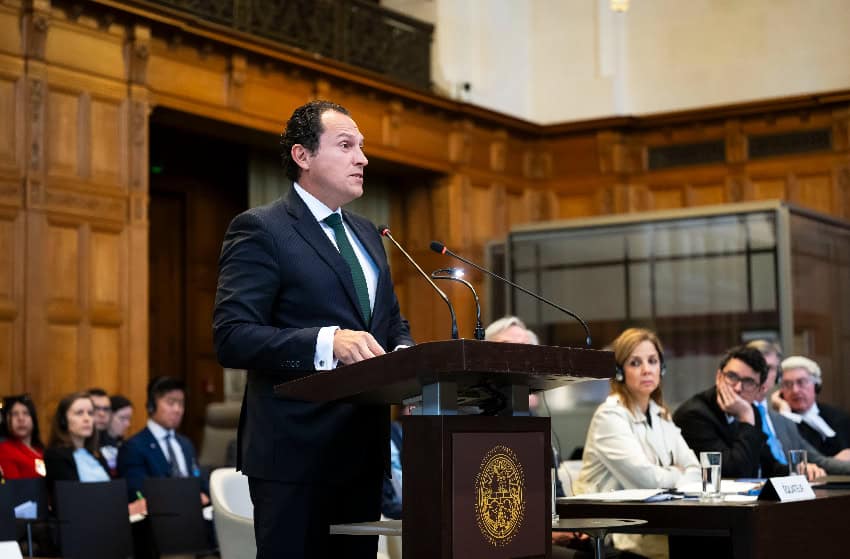
Alejandro Celorio Alcántara, legal advisor for Mexico’s Foreign Affairs Ministry, told the court on Tuesday that Ecuador had crossed “lines in international law which should not be crossed.”
The storming of the embassy came some four months after Glas — who has been convicted twice on corruption charges in Ecuador — took up residence, and a day after Ecuador declared Mexico’s ambassador to the South American nation a persona non grata.
Mexico broke diplomatic relations with Ecuador over the raid. Glas, who served as vice president in governments led by two Ecuadorian presidents, had been granted asylum by Mexico just hours before he was arrested.
Terán told the ICJ on Wednesday that the circumstances that led to police breaking into Mexico’s embassy in the Ecuadorian capital were exceptional.
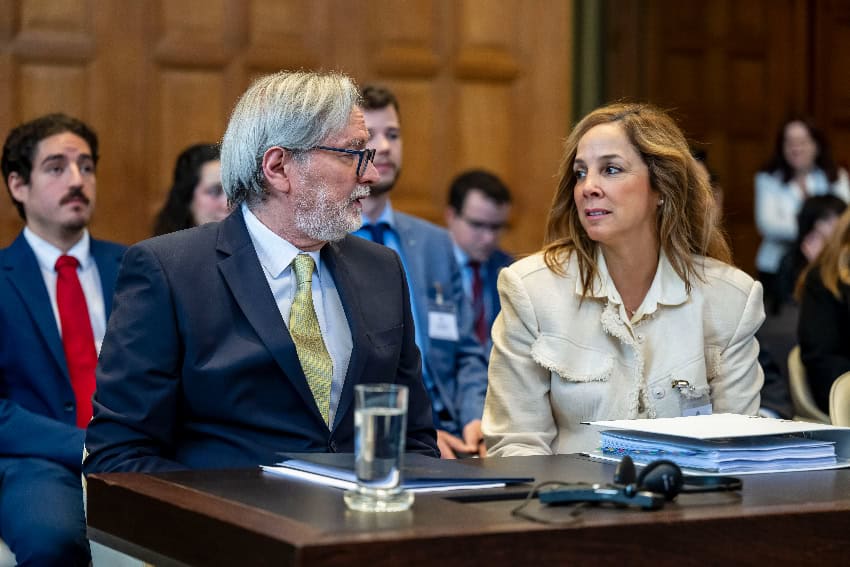
He also said that there was no need for the ICJ to take steps to ensure the security of the Mexican Embassy in Quito as “Ecuador has already provided assurances of its own volition, both to Mexico and to this court, that it will respect and protect the premises of Mexico.”
In addition, Terán noted that Ecuador had never previously raided a foreign embassy in its country and asserted it wouldn’t do so again. Prior to the raid, Ecuadorian authorities sought authorization from Ambassador Raquel Serur to enter the Mexican Embassy to detain Glas, but the request was not granted.
Another lawyer for Ecuador, Sean Murphy, told the ICJ that Mexico made “no genuine attempt” to negotiate a settlement with the Ecuadorian government, which — according to an Associated Press report — was “one of the preconditions for the court to impose interim orders.”
AP said that “judges will likely take weeks to reach a decision on Mexico’s request for preliminary orders” relating to the protection of its embassy in Quito. Mexican diplomatic staff deployed to the Ecuadorian capital returned to Mexico after bilateral ties were severed.
The ICJ is not likely to issue a final judgement in the dispute between Mexico and Ecuador any time soon.
Reuters reported that “ICJ cases typically take years before reaching a final judgment and while its rulings are legally binding, the court has no means of enforcing them.”
Ecuador files its own suit against Mexico
Before this week’s proceedings began, Ecuador filed its own complaint against Mexico with the ICJ over what it claimed was an illegal move to grant political asylum to Glas, who is now in a maximum security prison in the Ecuadorian port city of Guayaquil.
Ecuador’s Foreign Ministry said in a statement on Monday that Mexico failed to comply with “its obligations not to grant asylum to people who are being prosecuted or are on trial for common crimes or have been convicted by competent ordinary courts.”
Ecuador asked the International Court of Justice to rule that Mexico’s conduct violated several international conventions.
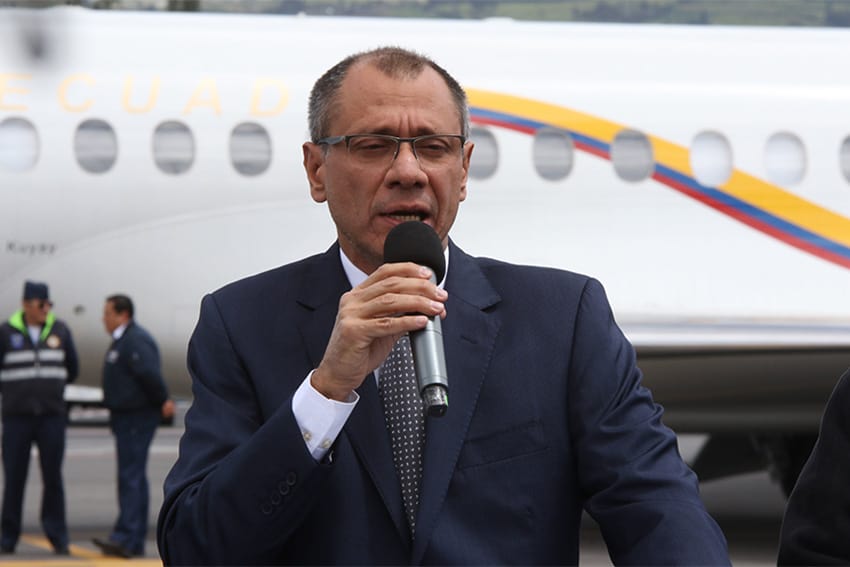
The ICJ noted that in its suit, Ecuador “contends that Mexico used the premises of its diplomatic mission in Quito between 17 December 2023 and 5 April 2024 ‘to shield Mr. Glas from enforcement by Ecuador of its criminal law’ in relation to several criminal proceedings and investigations instituted by Ecuador against him, and that these actions ‘constituted, among other things, a blatant misuse of the premises of a diplomatic mission.'”
It also noted that “Ecuador further accuses Mexico of unlawfully granting Mr Glas political asylum and of interfering in its internal affairs.”
No date has been set for hearings in the lawsuit filed by Ecuador.
